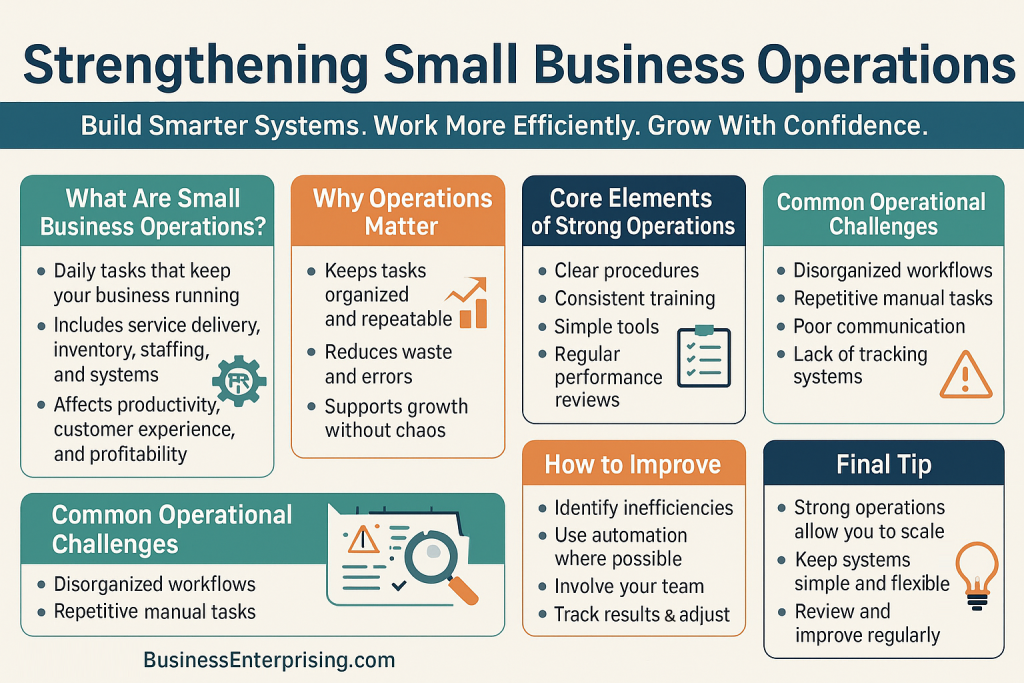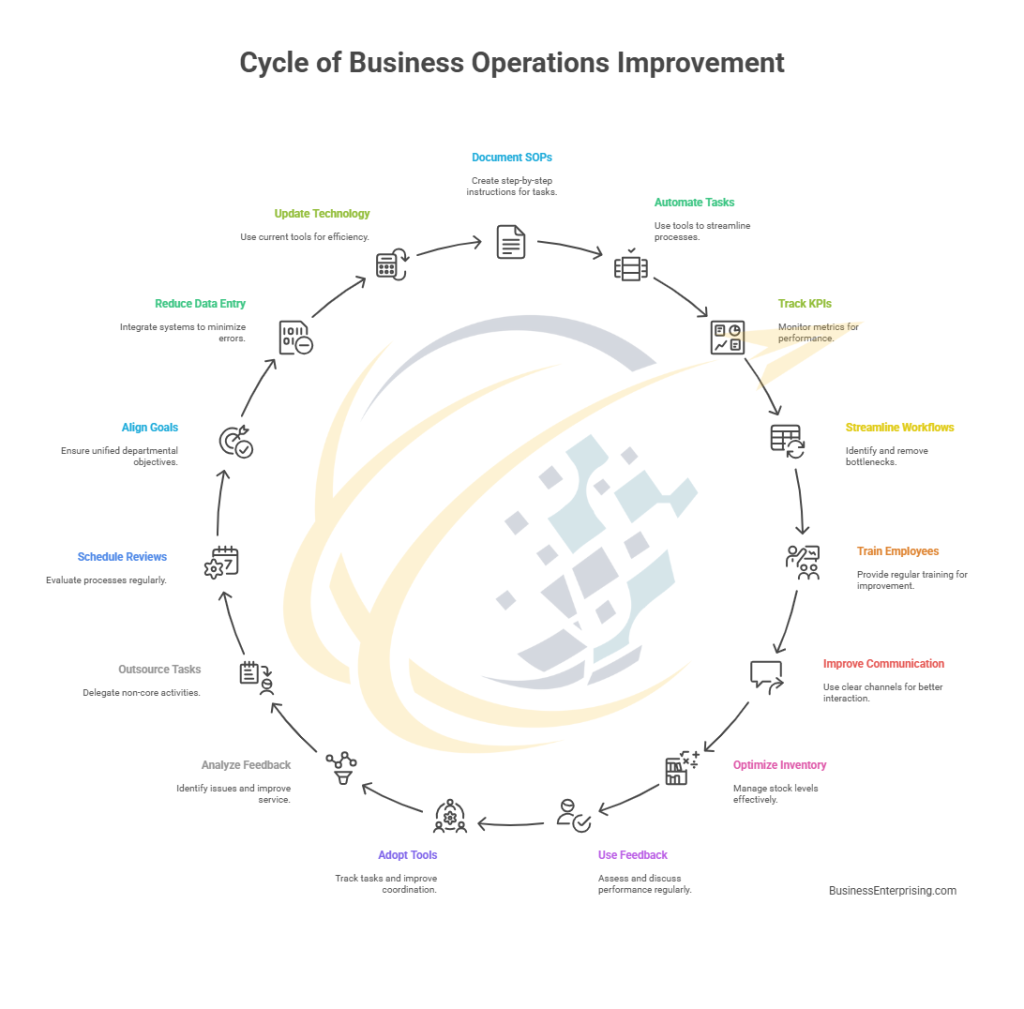
Additionally, your operations affect how fast you grow and how well you serve customers. If your systems are disorganized, you’ll waste time and lose money. Therefore, setting up basic routines can create a strong foundation. Even a small change can have a big impact on your results.
You don’t need complicated software or large teams to improve how you work. However, you do need a plan. Start by looking at what tasks you repeat every day. Then, ask what’s taking too long or causing problems. Additionally, talk to your team. They often know what slows things down.
Your goal is to simplify, not to add more work. Therefore, build systems that are easy to follow and update. Additionally, use tools that match your business size and budget. The right tools save time and reduce stress without getting in the way.
Strong operations help you stay organized and consistent as your business grows. However, they don’t build themselves. You must decide what works, test ideas, and adjust as needed. Additionally, review your systems often so they keep up with changes.
By treating operations as a priority, you’ll gain control and make smarter decisions. That kind of focus helps your business succeed over time.
What are business operations?
Business operations refer to the daily activities and processes that keep a company running and generating revenue.
Business operations refer to the daily tasks that keep your company running. These include managing resources, serving customers, and tracking performance. However, operations go beyond just handling orders or answering calls. They support how your business delivers products or services efficiently.
Additionally, operations involve coordinating your team, managing costs, and improving systems over time. As your business grows, your processes must evolve too. Therefore, regular reviews help you find what works and what needs fixing. Every small improvement can boost results.
For example, small business operations often focus on maximizing output with limited staff and tools. You might wear many hats each day. However, setting clear routines can help you stay organized and reduce errors. Additionally, using tools like scheduling apps or basic accounting software can save time.
Operations also include how you handle vendors, equipment, and inventory. Therefore, planning ahead keeps everything running without delays. If something breaks down or stock runs low, it affects your ability to deliver. Additionally, maintaining strong relationships with suppliers can help solve issues quickly.
Good operations make it easier to meet goals and grow. Therefore, build habits that support quality and consistency. Track your time, check performance, and look for ways to improve. Additionally, involve your team so they understand their role in the process.
Every part of your business connects through operations. When they run smoothly, you can focus more on strategy and growth. However, when they break down, it affects every area of your business.
How do I improve operational efficiency?
You can improve efficiency by streamlining workflows, reducing waste, automating tasks, and regularly reviewing performance metrics.
Improving operational efficiency means doing more with less effort. You want to save time, reduce waste, and boost output. Therefore, focus on making your everyday processes simpler and faster. Even small changes can create noticeable results over time.
Start by reviewing your current workflows. Look for tasks that slow you down or cause confusion. Additionally, ask your team where they see problems. They often know what’s working and what’s not. However, don’t rush to fix everything at once. Begin with one area and build from there.
You can also use simple tools to automate repetitive tasks. Scheduling, invoicing, and email follow-ups are common areas to streamline. Therefore, spend less time on manual work and more time growing your business. Additionally, review your performance regularly. Numbers help you spot trends, errors, or missed opportunities.
For small business operations, efficiency keeps you competitive. You may have limited staff or budget. However, smart systems let you do more without hiring more. Additionally, you can train your team on clear procedures. This reduces mistakes and helps new employees learn faster.
Reducing waste is another area to improve. Review your supply usage, inventory levels, and customer returns. Therefore, track what’s getting used, what’s being wasted, and what could be improved. Additionally, set clear goals so you know what success looks like.
When your business runs smoothly, you’ll save money and deliver better service. Operational efficiency doesn’t require big investments. Instead, it takes focus, feedback, and follow-through.
What is the difference between operations and management?
Operations focus on executing daily tasks, while management involves planning, organizing, and overseeing those operations.
Business Operations and management often get grouped together, but they serve different purposes in your business. Operations handle the daily work. These tasks keep things moving and customers satisfied. However, management steps back to focus on bigger-picture planning and oversight.
Additionally, operations deal with doing the work. This includes processing orders, scheduling staff, and maintaining systems. You or your team follow set routines to stay productive. Therefore, clear processes help you get results consistently. However, when those processes break down, management steps in to adjust or improve them.
Management looks at goals, resources, and outcomes. Managers decide how to use time, money, and people wisely. Additionally, they solve problems, review performance, and adjust strategies as needed. Therefore, they guide operations but don’t always handle tasks directly.
In small business operations, the same person may handle both roles. You might plan one hour and fill orders the next. However, it helps to know which hat you’re wearing. Management is about direction, while operations focus on action. Additionally, having clear roles, even if shared, can improve how you work.
You need both roles to run a business well. Operations keep things running now. Management prepares you for what comes next. Therefore, balance your time between planning and doing. Additionally, schedule time to review results and adjust plans.
Understanding the difference helps you lead better and stay focused. When you separate these roles clearly, you get better results and fewer daily problems.
Why are standard operating procedures (SOPs) important?
SOPs create consistency, reduce errors, and help train employees by providing clear instructions for routine tasks.
Standard operating procedures, or SOPs, help your business run with more consistency. They provide step-by-step instructions for routine tasks. Therefore, everyone knows exactly what to do and how to do it. This cuts down on confusion and mistakes.
Additionally, SOPs are useful for training new employees. Instead of guessing, your team can follow a clear guide. However, they also help experienced staff stay on track. Over time, even small changes in how tasks are done can create problems. Therefore, written procedures help keep everything aligned.
SOPs also save time. When your team doesn’t need to ask questions constantly, they work more efficiently. Additionally, it makes you less dependent on any one person. If someone’s out, another employee can step in and follow the same process. That keeps your business moving.
For small business operations, written procedures can make a big difference. You may not have a large team. However, clarity helps avoid rework, delays, and frustration. Therefore, even simple SOPs can improve quality and reduce stress. Additionally, they make it easier to scale as your business grows.
However, SOPs only help if they’re followed and kept up to date. Review them regularly to match any changes in tools or workflows. Additionally, involve your team when updating or creating them. This builds buy-in and ensures accuracy.
By creating SOPs, you build a stronger foundation for your business. They give your team confidence, help maintain quality, and support smoother operations every day.
How do I track business performance?
Track performance using key performance indicators (KPIs), financial reports, customer feedback, and productivity metrics.
Tracking business performance helps you understand how your company is doing and where it can improve. You need more than guesses. Therefore, use actual numbers and feedback to guide your decisions. This helps you stay focused and make changes that matter.
Start with key performance indicators, or KPIs. These are simple metrics tied to your goals. Sales, expenses, customer retention, and order accuracy are all common examples. However, your KPIs should match what matters most in your business. Additionally, track them regularly so you spot changes early.
Financial reports also offer valuable insights. Look at profit and loss statements, cash flow, and balance sheets. Therefore, you can see where money comes in and where it goes. Additionally, compare current numbers to past periods to check progress.
You should also listen to your customers. Feedback from reviews, surveys, and support requests shows what you’re doing well or missing. Therefore, use this input to improve service and build loyalty. Additionally, review employee output and time spent on tasks. Productivity trends often reflect deeper issues in small business operations.
However, tracking only helps if you take action. Set regular check-ins to review what’s working and what’s not. Additionally, share results with your team to keep everyone aligned. You don’t need fancy tools. Even basic tracking can reveal helpful patterns.
The goal is to catch problems early and keep improving. When you track performance with purpose, your decisions get smarter—and your business gets stronger.
What role does technology play in operations?
Technology supports operations by automating tasks, improving communication, enhancing data tracking, and reducing manual errors.
Technology plays a major role in business operations by making tasks faster, easier, and more consistent. It saves time and cuts costs. Therefore, many small businesses rely on simple tools to handle daily work. You don’t need a big budget to benefit from smart systems.
Additionally, technology helps you reduce errors. Manual tasks like data entry or inventory updates can lead to mistakes. However, automation reduces those risks. Tools that sync systems or auto-generate reports free up time. Therefore, your team can focus on higher-value work.
Communication also improves with technology. Messaging apps, shared calendars, and cloud-based documents make teamwork easier. Additionally, you can check project progress or assign tasks from anywhere. For small business operations, this flexibility helps you respond quickly and stay organized.
You can also track data more effectively. Point-of-sale systems, CRMs, and dashboards give you real-time performance insights. Therefore, you make decisions based on facts, not guesses. Additionally, stored data helps you spot patterns and forecast demand more accurately.
However, technology should support your goals—not distract you. Use tools that fit your business size and type. Avoid complex systems you won’t use fully. Additionally, review your tech setup once or twice a year. Remove tools that no longer help and upgrade what does.
The right technology strengthens operations by removing friction. When tools work well, your processes run smoother and your team performs better.
Conclusion
Running a business takes more than a great idea. You also need strong operations that support daily tasks and long-term goals. However, many owners overlook how small adjustments can improve results. Therefore, paying attention to your operations can lead to better performance and less stress.
Additionally, operations give structure to everything you do. From hiring to customer service, each process depends on clear systems. However, those systems don’t build themselves. You must create, review, and improve them regularly. Therefore, treat operations as part of your overall business strategy.
Technology, SOPs, and clear communication all help your team stay on track. Additionally, tracking performance lets you make better decisions. If something isn’t working, your data will show it. Therefore, don’t ignore the numbers. Let them guide your next steps.
For small business operations, efficiency can be a real advantage. You may not have a big team or deep resources. However, thoughtful processes allow you to compete and grow. Additionally, they help you deliver consistent value to your customers every day.
As your business evolves, so should your operations. Therefore, stay flexible and keep testing new ideas. Additionally, get input from your team. They often spot issues you might miss. Strong operations make everything else easier—from marketing to sales to customer support.
With the right habits and tools, you can build systems that support both stability and growth. Focus on what works, adjust what doesn’t, and keep improving how your business runs.



